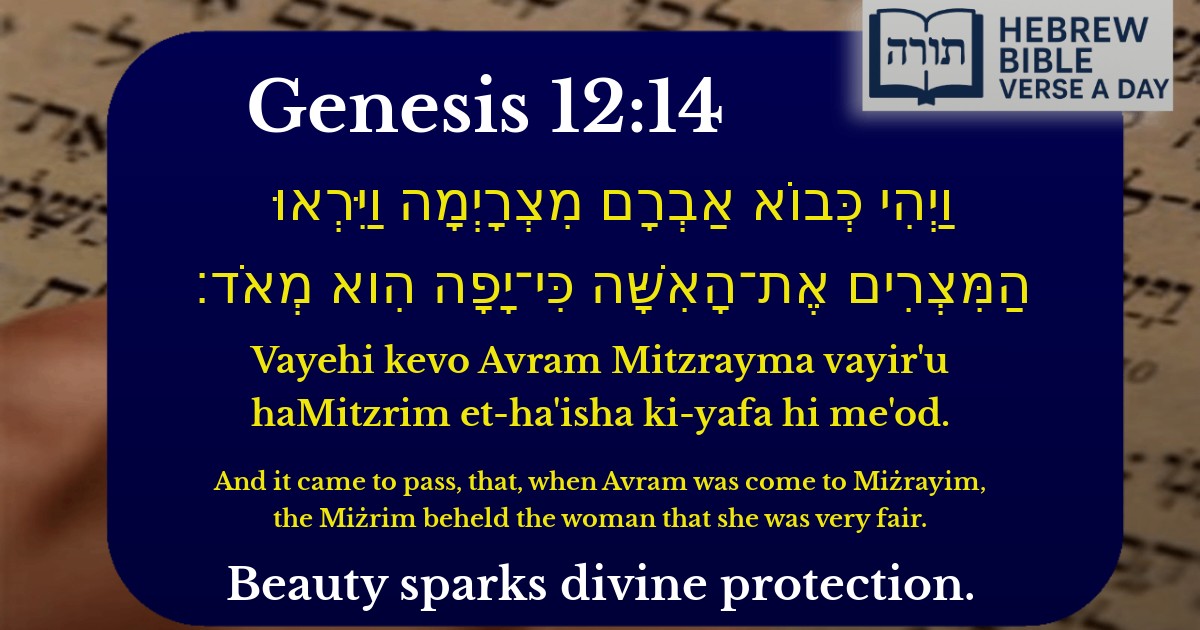Join Our Newsletter To Be Informed When New Videos Are Posted
Join the thousands of fellow Studends who rely on our videos to learn how to read the bible in Hebrew for free!
Hebrew Text
וַיְהִי כְּבוֹא אַבְרָם מִצְרָיְמָה וַיִּרְאוּ הַמִּצְרִים אֶת־הָאִשָּׁה כִּי־יָפָה הִוא מְאֹד׃
English Translation
And it came to pass, that, when Avram was come to Miżrayim, the Miżrim beheld the woman that she was very fair.
Transliteration
Vayehi kevo Avram Mitzrayma vayir'u haMitzrim et-ha'isha ki-yafa hi me'od.
Hebrew Leining Text
וַיְהִ֕י כְּב֥וֹא אַבְרָ֖ם מִצְרָ֑יְמָה וַיִּרְא֤וּ הַמִּצְרִים֙ אֶת־הָ֣אִשָּׁ֔ה כִּֽי־יָפָ֥ה הִ֖וא מְאֹֽד׃
וַיְהִ֕י כְּב֥וֹא אַבְרָ֖ם מִצְרָ֑יְמָה וַיִּרְא֤וּ הַמִּצְרִים֙ אֶת־הָ֣אִשָּׁ֔ה כִּֽי־יָפָ֥ה הִ֖וא מְאֹֽד׃
🎵 Listen to leining
Parasha Commentary
📚 Talmud Citations
This verse is quoted in the Talmud.
📖 Bava Batra 15a
The verse is referenced in the context of discussing the beauty of Sarah, and how it led to the events involving Pharaoh.
📖 Sanhedrin 39b
The verse is mentioned in a discussion about the actions of Abraham and Sarah in Egypt, and the consequences thereof.


Rashi's Explanation of the Verse
Rashi (Bereshit 12:14) comments that the phrase "כי יפה היא מאד" ("that she was very fair") indicates that Sarah's beauty became even more pronounced upon entering Egypt. He explains that until this point, Avram had not fully recognized her beauty due to their modest lifestyle, but when they arrived in Egypt, her radiance became evident to all.
Midrashic Insights on Sarah's Beauty
The Midrash (Bereshit Rabbah 40:5) elaborates that Sarah's beauty was not merely physical but also spiritual. It states that her righteousness and piety enhanced her appearance, making her stand out even among the Egyptians. The Midrash compares her to a torch among candles—her inner light outshone all others.
Rambam's Perspective on the Incident
Rambam (Hilchot Issurei Biah 13:15) discusses the moral lesson from this episode, emphasizing that Avram's concern for Sarah's safety led him to take precautionary measures. He highlights the importance of pikuach nefesh (saving a life) in Jewish law, which can sometimes override other considerations.
Ibn Ezra's Literal Interpretation
Ibn Ezra (Bereshit 12:14) focuses on the plain meaning of the text, noting that the Egyptians were struck by Sarah's extraordinary beauty because she was unlike the women of Egypt. He suggests that her appearance reflected the distinctiveness of Avram's household, which was dedicated to monotheism and moral purity.